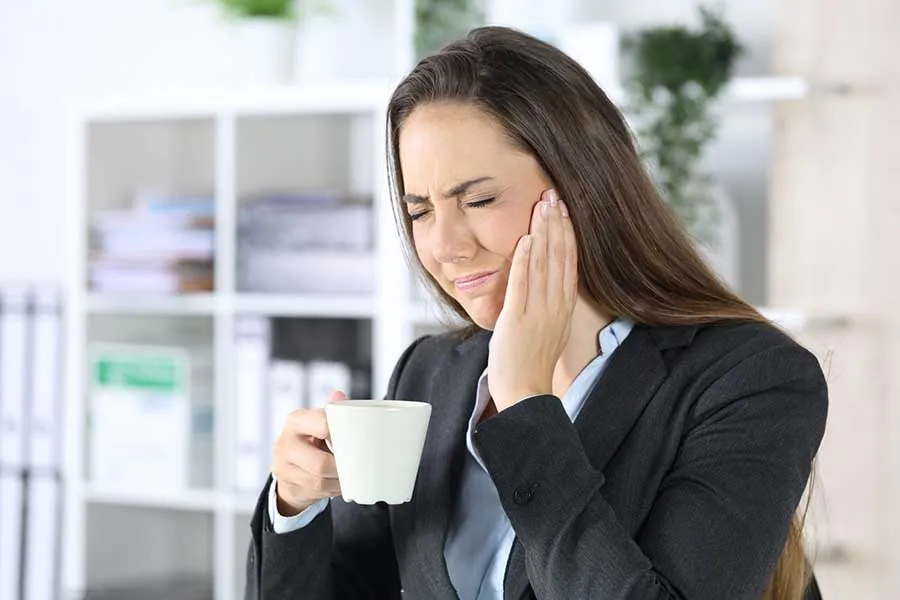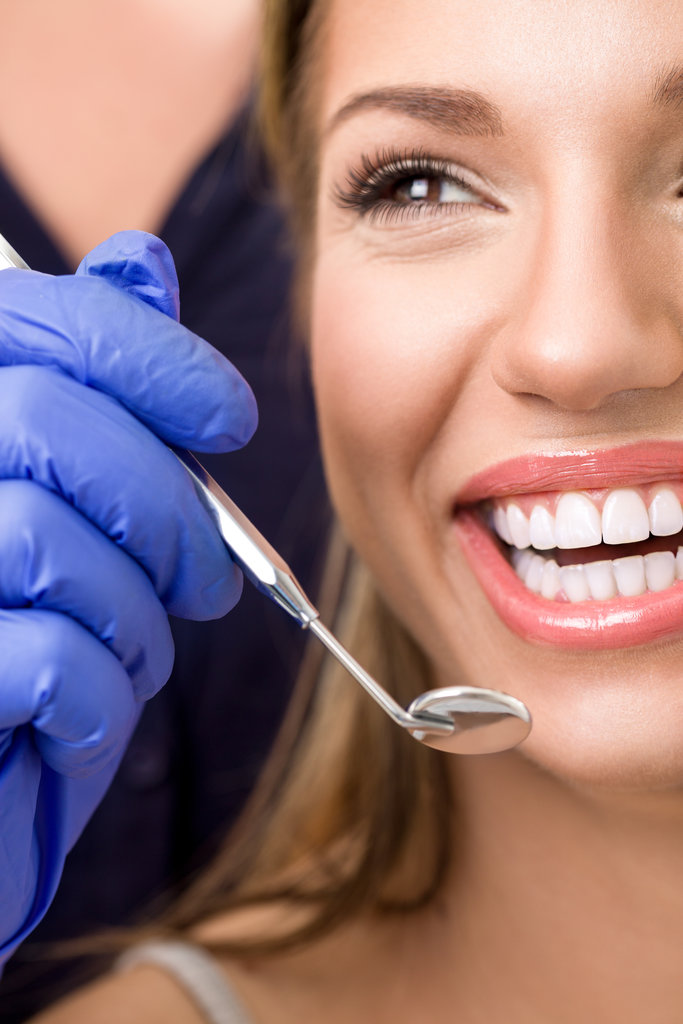When the simple act of speaking, eating, or yawning brings searing pain to your jaw, you may be experiencing temporomandibular joint disorder (TMD). This common but often misunderstood condition affects the temporomandibular joint (TMJ) that connects your jawbone to your skull. Unfortunately, this pain can range from mildly annoying to severely debilitating without proper intervention.
At Drs. Chin & Pharar Dentistry, our Las Vegas dentists provide comprehensive TMJ/TMD treatment for patients experiencing jaw pain, clicking, popping, or limited jaw movement. Our community-based, empathetic approach ensures you receive personalized care tailored to your specific symptoms and lifestyle needs.

Understanding TMJ Disorders
TMJ disorders occur when the complex system of muscles, bones, and joints responsible for jaw movement becomes damaged or inflamed. This condition, affecting approximately 5%-12% of adults, can develop from various causes and presents with several distinctive symptoms.
Common causes of TMJ disorders include:
Teeth grinding or clenching (bruxism)
Arthritis affecting the jaw joint
Jaw injury or trauma
Misaligned bite
Excessive stress and tension
Connective tissue diseases
If you’re experiencing symptoms like jaw pain, difficulty chewing, clicking sounds when opening or closing your mouth, facial pain, headaches, or limited jaw movement, you may be dealing with a TMJ disorder. Early diagnosis and treatment are vital for preventing the condition from worsening and causing more significant problems.
Flexible Payment Plans Available
Comprehensive dental treatments with flexible financing options to make quality care affordable for everyone.

Our Approach to TMJ/TMD Treatment
Many people struggle with TMJ disorders for years before seeking professional help, often trying ineffective over-the-counter remedies or simply enduring the pain. However, professional dental intervention can provide significant relief and stop long-term complications such as chronic pain, difficulty eating, and even depression related to ongoing discomfort.
At Drs. Chin & Pharar Dentistry, we take a multi-faceted approach to treating TMJ disorders, focusing on both alleviating immediate symptoms and addressing underlying causes for long-term relief.
Comprehensive Evaluation
Many people struggle with TMJ disorders for years before seeking professional help, often trying ineffective over-the-counter remedies or simply enduring the pain. However, professional dental intervention can provide significant relief and stop long-term complications such as chronic pain, difficulty eating, and even depression related to ongoing discomfort.
At Drs. Chin & Pharar Dentistry, we take a multi-faceted approach to treating TMJ disorders, focusing on both alleviating immediate symptoms and addressing underlying causes for long-term relief.
Conservative Treatments
We typically begin with noninvasive treatments to manage TMJ pain and dysfunction. For immediate pain relief, we may recommend applying moist heat or ice packs to the affected area, along with over-the-counter anti-inflammatory medications to reduce inflammation and discomfort. Soft food diets and jaw rest techniques can also provide significant relief during painful flare-ups.
Lifestyle modifications also play a critical role in managing TMJ disorders. We’ll help you identify and avoid activities or habits contributing to your symptoms, such as nail biting, chewing gum, or cradling the phone between your shoulder and ear. Additionally, stress management techniques can help lessen the tension that often manifests in jaw clenching or grinding.
Custom Oral Appliances
One of the most effective treatments for many TMJ sufferers is a custom-made oral appliance. These specially designed devices can:
Reduce teeth grinding and clenching
Properly position your jaw to relieve joint pressure
Protect your teeth from damage
Promote muscle relaxation
Help establish a more balanced bite
Each appliance is precisely crafted to fit your specific dental anatomy, ensuring maximum comfort and effectiveness. Unlike generic over-the-counter mouth guards, our custom appliances address your jaw alignment issues and provide targeted relief for your symptoms.
Advanced Treatment Options
For more severe cases, we may suggest additional treatments, including physical therapy jaw exercises to strengthen jaw muscles, improve range of motion, and minimize pain. These methods can be especially helpful when combined with other treatments.
Trigger point therapy can also be used to target specific areas of muscle tension to provide relief from TMJ-related pain. This focused approach can benefit patients whose symptoms primarily stem from muscle dysfunction rather than joint issues.
In some cases, we may work with other specialists to develop a comprehensive treatment plan addressing all aspects of your condition. This collaborative approach ensures you receive the most effective care possible, drawing on expertise from different healthcare disciplines.
Long-Term Management of TMJ Disorders
Managing TMJ disorders often requires ongoing attention and care. We’ll work with you to develop strategies for long-term management, including regular check-ups to monitor your condition and adjust treatments as needed.
Many patients find significant improvement with proper treatment and management techniques. Even in cases where complete resolution isn’t possible, most patients can achieve substantial pain reduction and improved jaw function, allowing them to enjoy everyday activities without constant discomfort.
Frequently Asked Questions about TMJ Treatment in Las Vegas, NV
What are the most common TMJ headache symptoms?
TMJ headaches typically present as dull, aching pain around the temples, jaw joints, and sometimes radiating to the neck and shoulders. You may also experience jaw clicking or popping sounds, difficulty opening your mouth wide, and pain when chewing. TMJ headaches often worsen in the morning due to nighttime teeth grinding and can be accompanied by ear pain or ringing. Our TMJ specialists in Las Vegas use advanced diagnostic techniques to identify the root cause and develop personalized treatment plans.
How do I know if I need a TMJ specialist in Las Vegas?
You should see a TMJ specialist if you experience persistent jaw pain, frequent headaches, clicking or popping sounds when opening your mouth, or difficulty chewing. Other signs include lockjaw episodes, ear pain without infection, or worn-down teeth from grinding. Our Las Vegas TMJ specialists have advanced training in temporomandibular disorders and can provide comprehensive evaluation using digital imaging and bite analysis to determine if TMJ is the source of your discomfort.
Can TMJ cause ringing in the ears (tinnitus)?
Yes, TMJ can absolutely cause tinnitus or ear ringing. The temporomandibular joint sits very close to your ear canal, and inflammation or dysfunction can affect nearby nerves and muscles. TMJ-related tinnitus often comes with jaw pain, clicking sounds, and may worsen when clenching your jaw. Our TMJ specialists in Las Vegas can evaluate whether your ear ringing is related to jaw dysfunction through comprehensive examination and recommend appropriate treatment to address both symptoms.
How much does TMJ treatment cost in Las Vegas?
TMJ treatment costs vary depending on the severity and treatment approach needed. Many insurance plans cover TMJ treatment as it’s often considered a medical condition. We accept most major insurance plans and offer financing through our in-house plan and Alfie financing. Our team provides detailed cost estimates after your examination and works with your insurance for maximum coverage.
What's the difference between a TMJ dentist and TMJ doctor?
A TMJ dentist specializes in jaw disorders from a dental perspective, focusing on bite problems, teeth grinding, and oral appliances. TMJ doctors may include various specialists like oral surgeons, neurologists, or pain management physicians. Our Las Vegas TMJ dentists have specialized training in neuromuscular dentistry and work closely with medical professionals when needed. We provide comprehensive care including custom splints, bite adjustments, and coordinated treatment plans for optimal results.
Can TMJ disorder cause jaw pain on one side?
Yes, TMJ disorder commonly affects one side more than the other, causing unilateral jaw pain. This can result from uneven bite pressure, injury to one joint, or habitual chewing on one side. Single-sided TMJ pain may include clicking sounds, muscle tension, and limited opening on the affected side. Our Las Vegas TMJ specialists use advanced imaging to evaluate both joints and create targeted treatment plans that address the specific side affected while preventing compensation patterns.
How long does TMJ treatment take to work?
TMJ treatment timeline varies by individual and treatment type. Custom night guards often provide relief within 2-4 weeks of consistent wear. Botox injections can show results within 3-7 days and last 3-4 months. Physical therapy and exercises may take 6-12 weeks for significant improvement. Comprehensive treatment plans typically show substantial improvement within 2-3 months. Our Las Vegas TMJ specialists monitor your progress and adjust treatment as needed to ensure optimal results.
Is TMJ treatment covered by insurance in Nevada?
Many insurance plans cover TMJ treatment when it’s medically necessary. Medical insurance often covers TMJ-related headaches and muscle treatments, while dental insurance may cover oral appliances. Coverage varies by plan and provider. We work with most major insurance providers including Delta Dental, MetLife, CIGNA, Anthem Blue Cross/Blue Shield, and others. We verify benefits before treatment and help maximize your coverage.
What should I avoid if I have TMJ disorder?
If you have TMJ, avoid hard or chewy foods like bagels, tough meats, and gum. Don’t open your mouth too wide when yawning or eating large foods. Avoid clenching your jaw, grinding your teeth, and nail biting. Stress and poor posture can worsen TMJ symptoms, so practice relaxation techniques. Our Las Vegas TMJ specialists provide personalized lifestyle recommendations and stress management techniques to help reduce symptoms and prevent flare-ups during treatment.
Get Relief from TMJ Pain at Drs. Chin & Pharar Dentistry
Living with TMJ pain affects more than just your jaw—it impacts your overall quality of life, making simple activities painful and frustrating. The good news is you no longer have to endure this discomfort.
Our Las Vegas dental practice specializes in helping patients with complex medical cases, including high-anxiety patients and those seeking care for TMJ/TMD issues. With our community-based approach to dental care, we take the time to truly understand your concerns and develop an effective treatment plan. To relieve jaw pain and explore your TMJ treatment options, call us at (702) 445-7075 or use our contact form to schedule your consultation.
